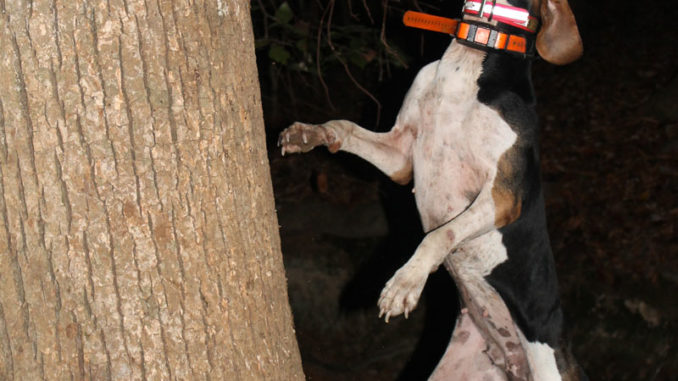
The number of South Carolina hunters who pursue raccoons with religious fervor may be falling, but that’s not stopping them from turning their hounds loose.
It seems among sportsmen and sportswomen there are houndsmen, and then there is everyone else. Caring for, breeding, training and hunting with hounds takes a commitment seldom seen in today’s “instant gratification” culture. You are either a lover of hounds or you are not; there doesn’t appear to be any middle ground.
Some are apparently born with the passion, having the song in their hearts from the womb, while others are introduced to it at some point and become entranced by the music of the night. Similar to people whose addiction to opera is lifelong and often misunderstood, some people cannot sleep without the sound of hounds echoing in their minds.
One night a few weeks ago, David Catoe of Lugoff was out training one of his champion Walker hounds, Wateree River SupaSioux, aka Sioux, a female who can really carry a tune. While many hunters who target raccoons with hounds like to run multiple dogs in a race, Catoe prefers to run one dog at a time.
“When they are alone, they have to do it all: strike the trail, follow the trail and tree the coon,” he said, explaining that when hunting in a pack or group, some hounds tend to follow, lead or go off by themselves.
Still, many hunters enjoy the chorus that several hounds make while racing though the nice air hot on the trail of a ringtail.
Driving through the night, headlights shining through barren trees in unknown forests, the truck suddenly stopped, Sioux was brought from her crate, GPS collar attached, and off she went in silence.
Catoe said, “She’ll work her way around and before long, we’ll be walking to her.”
Without much hesitation, the music began as Sioux struck a fresh scent; her high-pitched voice echoed through the night air, signaling the race was on. With every breath she howled, seeming to be nipping at the heels of some running raccoon. For 20 minutes the chase continued until her howls changed from more of a long bark to rapid deep desperate howls.
“She’s treed.” Catoe announced, driving around a ravine to make the walk to her a bit easier.
With her direction marked, headlamps illuminated the unknown path, and the closer Catoe got to her, the louder Sioux’s howls got until her form was illuminated by a light; she was trying to climb the tree to get to the coon.
Catoe shined his light up into the tree, and it was returned by the green glow of the raccoon’s eyes. The hunt over, Sioux was leashed and re-crated and another hunt begun for the chorus of music that echoes through the night in many places in South Carolina.
Sadly, in many regions of the South, raccoon hunting is fading as a generation of hunters retires and younger ones don’t seem to have the same passion for listening to the hounds.
“Keeping dogs is expensive and a lot of work, from breeding, vet bills, food and training, (and) a lot of people just don’t want the commitment of keeping dogs,” Catoe said.
The surge in the amount of acreage controlled by deer-hunting clubs also affects raccoon hunters. In parts of South Carolina with Wildlife Management Areas, there are places for hunters, but large portions of the state are absent of public land, so finding land to hunt is a difficult prospect.
Several organizations help the raccoon hunting industry alive with sanctioned hunts and competitions that draw large crowds. The Professional Kennel Club (PKC) and the United Kennel Club (UKC) dominate the scene. New and getting a lot of traction is the “Coon Hunters Kennel Club” (CHKC) which holds sanctioned hunts several times a month during the season, which ends Feb. 28 across the state. Hunting parties wishing to harvest raccoons can take three per party per trip.
If you have the opportunity to join in on a hunt and listen to the music of the night, do yourself a favor and join. The presence of good men and good dogs is enough, but to hear the passion of hounds doing what they were bred to do is something to behold and will bring out remembrance of days gone when houndsmen were the norm.




Be the first to comment